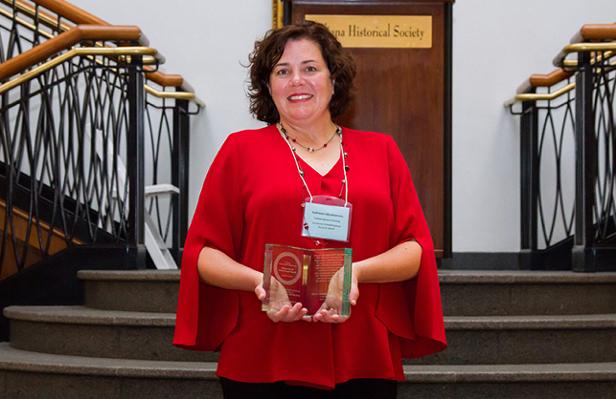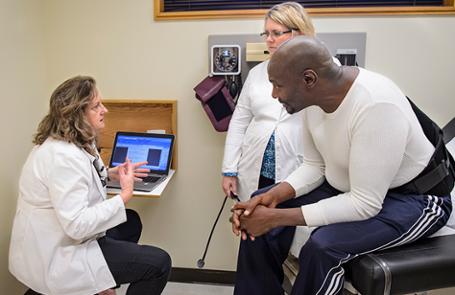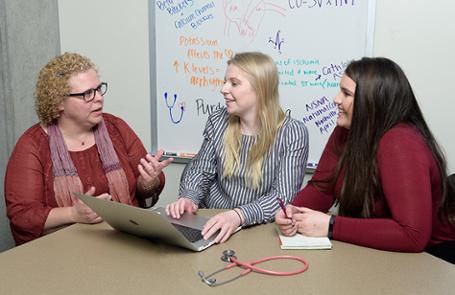Research effort tackles overmedication at Indiana nursing homes
Written by Phillip Fiorini
For 11 years, Kathleen Abrahamson served as a nurse at several Midwest nursing homes, gaining firsthand knowledge of the problems surrounding medication administration, particularly for patients prescribed to take 10 drugs or more every day, which is known as "polypharmacy."
Today, as a leading Purdue University nursing professor and researcher, Abrahamson is working with Indiana nursing homes on a two-year, $600,000 project funded by the Indiana State Department of Health. Collaborating with two statewide quality organizations, the project, officially named the Indiana Safer Medication Administration Regimens and Treatments campaign, or SMART, is touching residents at more than 20 nursing home facilities across Indiana.
Abrahamson received the Hulman Health Achievement Award in the Health Science and Research category from the Indiana Public Health Association in October 2017. The award recognizes those who conduct impactful, innovative research that focuses on disease prevention, health promotion and population health outcomes.
"In terms of polypharmacy and reducing polypharmacy, it is a problem that touches many areas of health care," says Abrahamson, whose team will wrap up SMART in April 2018.
"It's an economic problem, it's a health outcomes problem, it's a process problem. When people have to take 13 medications, it takes a long time. It decreases quality of life. In addition, polypharmacy is multidisciplinary. It's influenced by physicians, nurse practitioners, pharmacists. So we believed that if we could tackle this problem, it would have a significant impact across the board in terms of quality of care."
The problem is real, particularly in Indiana. Studies show that 25 percent of adults over age 45 in the Midwest region use six or more medications daily. In nursing homes across the country, 40 percent of residents are taking nine or more medications daily, and Abrahamson says estimates show that Indiana exceeds that number.
Inappropriate medication overuse resulted in $1.3 billion in avoidable health care costs in 2012, and officials say those costs have continued to rise. Beyond the financial impacts, nursing home residents are exposed to greater fall risks, adverse drug interactions, heart failure, renal failure, liver failure, delirium, cognitive decline and the risk of poor medication management, she says.
"As a nursing home nurse for 11 years, I found that medications were often inappropriately ordered or unable to be administered correctly," Abrahamson says. "If you have a patient that isn't able to fully cooperate, the drug's usefulness also can be decreased. There is a need for ongoing medication review as people age and become more debilitated, because some of the medications that they're taking may no longer be appropriate."
Through SMART, the Purdue researchers formed an Academic Detailing team and sought input from geriatricians and geriatric pharmacists with expertise and interest in nursing home care. At the heart of the intervention, she says, is a direct physician-to-prescriber communication using academic detailing techniques. This face-to-face education of prescribers by trained health care professionals, typically pharmacists, physicians or nurses, builds on peer-to-peer, evidence-based, prescribing-decision discussions.
The nursing homes also tapped Purdue quality-improvement experts and systems engineers in Purdue Nursing and across campus to tackle not just deprescribing, but the processes surrounding medication administration within their facilities.
During SMART's first year, some nursing homes had a goal of reducing unused "as-needed" medications that had not been used in six months or more and lower the use of antipsychotic medications, Abrahamson says. Staffs also planned to integrate individualized medication reviews into every resident-care planning session and develop a communication tool to empower nursing staff to question the need for a medication. They also focused on decreasing the prescribing of statins when not appropriate and reducing the use of proton pump inhibitors when a taper to H2 blockers was appropriate.
In SMART's final year, the project has focused on helping nursing homes monitor and evaluate their efforts and to share best practices with other facilities in the project and throughout Indiana. A policy brief also will be drafted for the ISDH, offering next steps aimed at solving this public health issue.
"Changes to these practices at Indiana nursing homes could improve the lives and protect the safety of vulnerable residents, while allowing individuals and public funding mechanisms such as Medicaid to save money," Abrahamson says.
Nursing doctoral student Yun "Karen" Cai, project manager for SMART, says she has had the opportunity to communicate with statewide nursing facilities, conduct site visits and draw on the expertise of researchers across many disciplines.
"I am a first-year doctoral student interested in nursing home research, and these experiences have prepared me for developing my own research trajectory," Cai says. "Dr. Abrahamson, the superstar in nursing home research, is such a great role model. She has been an outstanding mentor to me."
Jane Kirkpatrick, former head of the Purdue School of Nursing and professor emerita, says Abrahamson's multidisciplinary project is another example of how Purdue Nursing is leading change and advancing best practices in health care delivery. Abrahamson's work aligns with current policy initiatives and the goals of national organizations such as the Center for Medicare and Medicaid Services and the Society for Post-Acute and Long-Term Care Medicine, previously the American Medical Directors Association.
"Kathleen's insightful and novel approach to understanding and addressing quality in long-term care continues to transform health care delivery," Kirkpatrick says. "Dr. Abrahamson's impactful solutions to pervasive health care delivery problems, her record of success in teaching and research, and the robust pace of her scholarship at Purdue clearly speak to her knowledge and ability."



